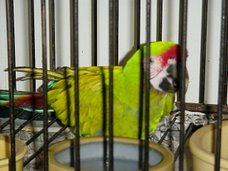The trouble with dead
relatives is that they don’t really vanish. True, they have become transparent,
meat bodies dissolving, drifting away like clouds, but like clouds their spirit
selves can reappear. For example, here is my mama, Ragni Ourai. Comfortably settled in a plastic basket we used to share when she was alive, her nose is resting on
its rim. If I had outward looking eyes, I would be able to see the back curve of
this basket through her head. However transparent, Mama Ragni’s voice isn’t a
wind’s whisper. She barks her instructions quite distinctly into my ears. I’m
blind but not deaf. She’s tells me how her foster parents, Mama Zeida Patitas
and Papa Maruka insisted on lingering around to school her and my papa, Sunja
Oura. Traditional hrana (our kani name for dog) tales and entertaining accounts of the
couple’s adventures in Mexico were welcome, but their advice for the
youngsters, Ragni and Sunja, was not. Although a bit shy, my mother definitely
believes she knows everything she needs to know, without any more information,
thank you. I feel the same way.
My Papa Sunja is more mellow.
He can listen with one ear awake, the other snoozing. My parents’ most pleasurable
moments during ancestor visits were those when Zedai’s adopted adult kitten,
bossy Miss D. (for Douglasina or Dreadful) received a maaki (ghost
spirit in kani) scolding. Seasons later, while stretched out scentless and
transparent on our doghouse roof, Grandma Zeidai insisted on educating me, too.
Mama Ragni would pace around grumble growling that spirit wisdom was nonsense, but I
appreciated hearing about adventures so different from the events of my San
Jose days. Oh, to sit on a beach by something called ocean, and be offered
fresh fish! My fishie in the dishie was always cooked and shaped into
kibble. ”I once nearly tumbled down into a very huge
hole in the ground called a canyon,” says Grandma Zeidai. “And you prickled
that long nose of yours snuffing Mexican cactus,” chuckles Grandpa Maru.
“Remember how you decided to guard our print shop by lying on a bed there.”
He prefers to tell me about legendary hrana heroes, such as black-coated Eskan, who stole back
Lord Sun’s eye from the monster Swallower, only to be burned white as ash and
sun-blinded in both eyes. Papa Sunja recites stories about dogs who in their
first or second lives were reborn as a bear, a boar, an elephant, or even as a
cat (a punishment, he suspects).
Some mid winter evenings the
Willis Avenue kitchen is crowded with transparent guests, nosing and nudging
each other for a spot to stretch out. It’s easier now to recognize them since I
see with my mind eyes. I’d prefer a peaceful nap, but, as Grandpa Maru reminds
me, I will soon have a great deal of time to sleep. I ask him if he returns to
our house on Seventh Street. I know he loved its garden and the neighboring
streets where he and Grandma Zeidai would take walks.” Much changed outside,”
he says, “but the grapefruit tree and smelly bay remain as evergreen as I
remember.” Occasionally, translucent Fred, once a human member of Seventh
Street Collective, darts into our yard in the shape of a hummingbird for a
sweet sip of news from our Willis Avenue garden flowers. He says it’s easier to
flit around as a live creature when visiting San Jose family. Humans have
difficulty recognizing maaki
relatives.
Soon Lord Sun will wake
earlier. Dozing seeds will stretch shoots eagerly up through the warming soil
to begin new lives. Spring winds will sweep up our troublesome but mostly
welcome ancestor maaki into the
restless clouds, hurrying them away to a summer land where they can hunt and
play until our winter memories recall them.
Contributed by Uli Var



No comments:
Post a Comment